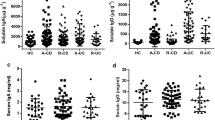Abstract:
The presence of perinuclear anti-neutrophil cytoplasmic antibodies (P-ANCAs) and that of antibodies against cathepsin G, a target antigen for P-ANCAs, was determined in the sera of patients with ulcerative colitis (UC), relative to the endoscopic severity and disease activity. P-ANCAs were detected by indirect immunofluorescent assay (IIF) on ethanol-fixed human neutrophils. Antibodies to cathepsin G were detected by an enzyme-linked immunosorbent assay (ELISA) and Western blotting. P-ANCAs were detected by IIF in 62.5% of 32 patients with active UC. Anti-cathepsin G antibodies were detected in 40.6% of 32 patients with active UC, and their prevalence was significantly higher in patients with severe colitis, as determined by endoscopy, than in those with mild or moderate colitis (P < 0.05). The prevalence and titers of anti-cathepsin G antibodies were significantly higher during the active than the inactive phase of the disease (P < 0.05). Measurement of titers of anti-cathepsin G antibodies by ELISA in the serum is useful for evaluating the activity of UC.
Similar content being viewed by others
Author information
Authors and Affiliations
Additional information
Received: June 21, 1999 / Accepted: March 24, 2000
Rights and permissions
About this article
Cite this article
Kuwana, T., Sato, Y., Saka, M. et al. Anti-cathepsin G antibodies in the sera of patients with ulcerative colitis. J Gastroenterol 35, 682–689 (2000). https://doi.org/10.1007/s005350070047
Issue Date:
DOI: https://doi.org/10.1007/s005350070047



